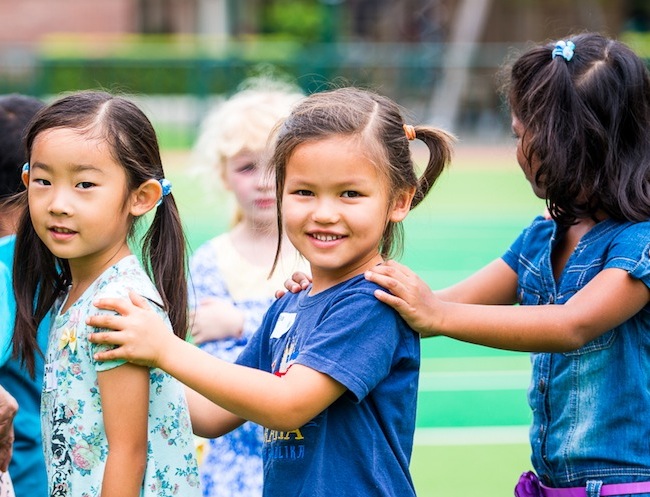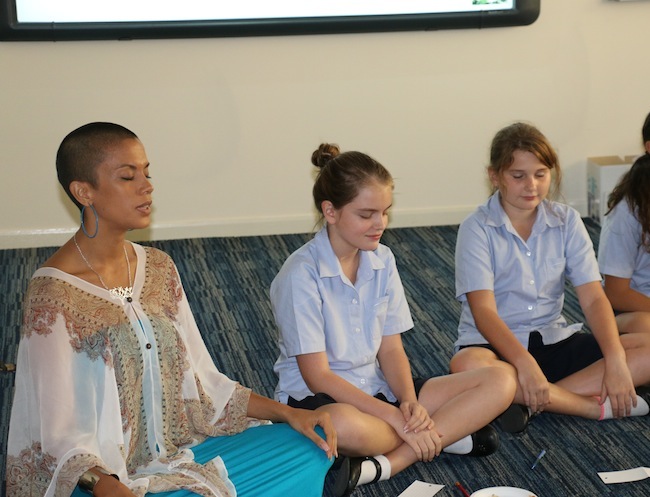
Tanglin Trust School is still progressive in its 90th year
This year marks an extraordinary milestone for Tanglin Trust School. In March 1925, the intrepid Anne Griffith Jones established TTS with just 5 students in the lush jungle of Singapore. Her focus then was providing British education on Singaporean soil to allow children to study at home, rather than thousands of kilometres away in ‘ole Blighty. Ninety years on, the school now boasts over 2,700 students and world-class facilities.
Singapore, also in the throws of a celebratory year with SG50, has evolved into a sleek, savvy, economic world power. The issues facing our third culture kids are eminently more sophisticated than in the pre-war colonial days. TTS knows only too well the pressures on kids of today, and incorporates Mindfulness into its class practices. Like their founder, today’s staff and leaders of Tanglin Trust School, recognise the importance of home and school working together and have created the Tanglin Trust School Mindfulness Program.
Mindfulness is a bit of a buzzword right now. What’s it all about?
Let’s face it, the world our kids are growing up in today couldn’t be any more different from the relatively laid back, care-free childhood we had. Our kids lead ‘over-connected’, multi-tasking lives as they rush from breakfast, to school, to swimming lessons, back home for a spot of homework and then to bed. And at the end of it all you ask them what they did with their day, and invariably you get the answer: “I don’t know”. They don’t get time to stop and smell the flowers, let alone to notice how they are feeling. Mindfulness is the practice of “paying attention, on purpose, in the present moment, with curiosity and kindness to things just as they are” (Jon Kabat Zinn). There’s a body of pretty compelling scientific evidence behind the practice, with recent studies finding that Mindfulness is key to improving physical and mental wellbeing.
Essentially, if our kids are overwhelmed, it’s tough for them to concentrate and learn to the best of their ability. Education is all about arming our kids with the tools they need to lead a happy and fulfilling life. In order to thrive in an ever-evolving world, kids need to adopt effective coping strategies. By bringing Mindfulness to children, adolescents and teens, we are planting the seeds of sustainable success. Once our kids have developed conscious strategies to deal with any stress or strain that comes their way, there’ll be nothing stopping them.
Incorporating Mindfulness into the Tanglin Trust School Program
Ok, so we think we have our head around the basic idea of Mindfulness. But how does it translate into everyday practice? At Tanglin Trust School, teachers share simple activities at the beginning of each day and as transitional activities as the day progresses. Sitting meditation is a core component, but it’s also about understanding your child’s individual learning style (kinaesthetic, visual, auditory) and knowing the kind of mindful exploration that will best engage them. Tanglin’s aim is to encourage students to find what works best for them to enhance focus and retention of academic information. Teachers lead by example by modelling Mindfulness, as they know only too well that it’s something that has to be caught not taught!
The counselling team have been instrumental in skilling up teachers so that they can share mindfulness practices in the classroom. Practically speaking, this involves using simple breathing techniques with a small physical component. They’re very versatile and can be applied at different times of the day – a body wake up pat down in the morning to get invigorated or touching on ‘reset’ buttons in the afternoon to help students become calm yet alert. By employing these simple yet effective techniques, students are much more receptive to receiving new information, which in turn enhances their learning experience.
Tips for Encouraging Mindfulness in your Child’s Everyday Life
You can reduce your child’s stress levels at home by making Mindfulness skills fun and engaging. Don’t expect your wunderkind to become an overnight expert. Don’t even call it ‘Mindfulness’. Simply take ‘nature breaks’. Organise play dates where use of technology is banned. Here are some tried and tested Mindfulness methods Tanglin Trust School recommends:
1. Heart Breathing
The innovative HeartMath ‘Test Edge’ method assists kids’ ability to meet life challenges with resiliency, intelligence and compassion. It’s designed to be simple, relaxing and easy to do no-matter your location. Here are the 6 key steps:
- Think of something you are grateful for, something that makes you smile from the inside. Perhaps a pet, a favourite person or place.
- Sit comfortably, close your eyes and relax.
- Take five slow breaths.
- Place your hands on the centre of your chest.
- Recall the positive memory or thought that makes you smile. Breathe in the smiling, happy energy and imagine that your breath is moving into the area underneath your hands.
- Take five more slow breaths.
2. For Kids with stronger auditory awareness
Focus on a sound for as long as it takes for that sound to fade away.
- Sit comfortably and close your eyes.
- Breathe steadily.
- Raise your hand when you can no longer hear the sound.
- Strike a bell or a chime bar.
- When the child’s hand goes up, ask them to focus on the sound of their own breath.
What we love about these exercises is how quickly they take us from manic to calm. Give it a go yourself with the kids, they are far more likely to join in with you than to sit down and be instructed. Maybe a good post dinner, pre-bath-time activity when the family (us included) could do with a little quiet reflection. It’s a great way to ease frayed nerves all around.
Want to find out more about Tanglin Trust School and the Mindfulness program?
You’re in luck, with the T90 celebrations in full swing, the calendar is jam-packed with events and activities to get involved with at Tanglin Trust School. Click on this link to the T90 microsite or follow the T90 twitter feed #TTST90 or @TanglinTrust for more information.
This post is sponsored by Tanglin Trust School.


